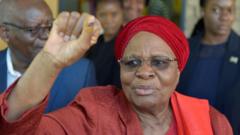This website uses cookies so that we can provide you with the best user experience possible. Cookie information is stored in your browser and performs functions such as recognising you when you return to our website and helping our team to understand which sections of the website you find most interesting and useful.


Netumbo Nandi-Ndaitwah, from the governing South West Africa People's Organisation (Swapo), looks set to become Namibia's first female president with more than 90% of the votes from last week's disputed election now counted.
The electoral commission said she had won more than 58%, with her closest rival Panduleni Itula getting just over 25% of the vote share.
But following logistical problems and a three-day extension to polling in some parts of the country, Itula said on Saturday that his party would not recognise the results alleging electoral malpractice.
Swapo has been power in the large but sparsely populated southern African country since independence in 1990.
A party stalwart, Nandi-Ndaitwah, who is currently the vice-president, is a trusted leader having served in high government office for a quarter of a century.
Tanzania's Samia Suluhu Hassan is Africa's only female president, so Nandi-Ndaitwah would be joining an exclusive club if she is victorious.
To avoid a second-round run-off, a candidate needs more than 50% of the vote to be declared the winner.
A trained dentist, Itula, of the Independent Patriots for Change (IPC), is seen as more charismatic than Nandi-Ndaitwah and managed to dent Swapo's popularity in the last presidential election in 2019, reducing its vote share to 56% from 87% five years earlier.
The IPC has said it will “pursue justice through the courts” and has encouraged people who felt that they had been unable to vote because of mismanagement by the electoral commission to go to the police to make a statement.
Swapo led the struggle for nationhood against apartheid South Africa. Ahead of last Wednesday's general election there had been some speculation that it would suffer the fate of other liberation parties in the region.
South Africa’s African National Congress lost its outright parliamentary majority in May and the Botswana Democratic Party was kicked out of power after nearly six decades following October's election.



 Africana55 Radio
Africana55 Radio 
